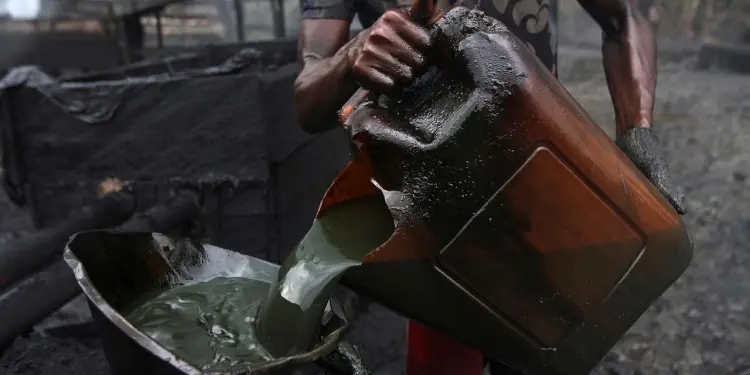Last weekend, the country was abuzz when it was uncovered that an unauthorised 4km pipeline was syphoning crude oil from the Trans-Forcados pipeline for over 9 years. Right now, 58 illegal crude oil extraction sites have been discovered in Delta and Bayelsa states.
A bad situation
Crude oil theft in Nigeria has taken on an unprecedented nature. From 2.5 million barrels at the end of 2014 to struggling above 1.9 million barrels for the past 7 years. The country has consistently performed under expectation.
According to Mele Kyari, oil theft has been occurring in the country for over 22 years, but the scale and rate at which it has recently increased are unparalleled.
Nairametrics stated that three active oil terminals, Forcados, Bonny, and Brass, had all been shut down as a result of the alarming rate of crude oil theft, which results in the loss of approximately 600,000 barrels per day.
A quick look at the past
According to Nigeria’s oil auditing body, NEITI, the West African country lost 42.25 million barrels of crude oil worth $2.77 billion to oil theft in 2019.
In 2018, around 53.28 million barrels of petroleum disappeared from Nigeria’s reserves. The total revenue of the oil and gas federation is expected to be N9.37 trillion in 2022. Nonetheless, as of 30th April 2022, just N1.23 trillion had been realized out of the projected N3.12 trillion, reflecting a 39% performance.
Any end in sight
Mr. Mele Kyari, Group Managing Director of NNPCL, stated during a meeting with Nigeria’s Senate ad hoc committee on oil theft that they have deactivated 395 illicit refineries, demolished 273 wooden boats, destroyed 374 illegal reservoirs, and destroyed 1,561 metal tanks.”
They have also seized and burned over 49 trucks, identified 898 illegal oil pits so far, and demolished I219 cooking locations.
General Lucky Irabor, Nigeria’s chief of defence staff, has stated that an inquiry will be conducted to determine who is responsible for crude oil theft and how long it has been ongoing, among other issues.
The implications.
According to the federal government, economic sabotage is dragging Nigeria to the verge of bankruptcy. The NNPC hasn’t been able to submit oil sales receipts to the central bank in the last six months and the company’s transition into a public limited liability business exacerbates the situation.
President Muhammadu Buhari expressed “concern” over the “enormous” impact of large-scale crude oil theft on the country’s earnings. According to Nigeria’s fiscal performance report for January to April, this underperformance was owing to severe oil production shortages such as shut-ins caused by pipeline vandalism and crude oil theft, as well as high petrol subsidy expenditures due to higher landing costs of imported items.
According to financial specialists, $10 billion in revenue would have rescued the country, especially now that the economy is facing a double situation of an empty treasury and rapid decline in oil production. Less than 10% of that amount would have been sufficient to meet the demands of university teachers on strike since February.

